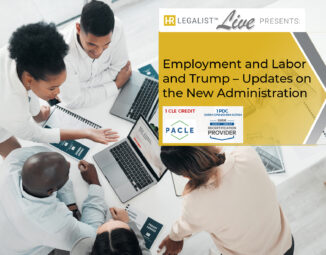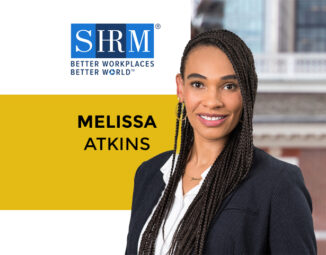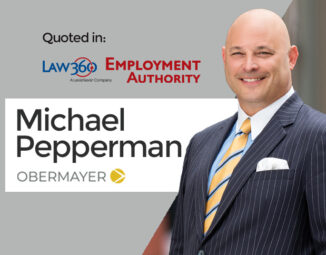What To Watch As Pa. Justices Consider Facebook Post Firing
In this era of social media, employees often post information online about their personal lives, their political views and information related to their jobs. Social networks have increasingly blurred the boundaries between employees’ personal and professional lives, as many employees follow their colleagues, and even supervisors or subordinates, on popular social media platforms such as Facebook, Instagram and Twitter.
As a result, employers can easily become aware of their employees’ off-duty lives and personal viewpoints, even if they do not intentionally seek this information. Once aware of problematic posts, employers are inevitably confronted with a dilemma: Can/should we fire the employee?
Most U.S. states are “at-will employment” states, where either the employee or the employer can terminate their relationship, for any reason — as long as that reason is not illegal under state or federal law, or in violation of a contract or collective bargaining agreement. There are many situations where employees can be lawfully fired for their social media activity. Posting trade secrets or confidential business information online can violate confidentiality agreements or employer policies and handbooks, and can therefore be grounds for termination. Employee harassment on social media, including sexual harassment, can also be grounds for dismissal.
However, the law can limit an employer’s ability to take action based on an employee’s social media use. Government employers, in particular, must consider employee free speech rights. On Jan. 8, 2019, the Pennsylvania Supreme Court granted a petition for allowance of appeal in Carr v. Commonwealth of Pennsylvania,[1] a case that pits a public employee’s interest in free speech against her employer’s interest in protecting its reputation.
Rachel Carr was a roadway technician for the Pennsylvania Department of Transportation who was terminated from her job in June 2016, after making a Facebook post complaining about the “horrible school bus drivers” near her home in Erie, Pennsylvania. After describing a recent encounter where she almost “t-boned” a school bus due to the bus driver’s unsafe maneuver, Carr ended her post by stating that she did not “give a flying [expletive] about those babies and I will gladly smash into a school bus.”
Carr appealed her termination to the Pennsylvania Civil Service Commission. After a hearing which included testimony from Carr and two DOT employees, the commission affirmed Carr’s termination and dismissed her appeal. The commission credited the testimony of the DOT employees, who testified that one of the DOT’s main goals was to ensure the safety of the traveling public, and that Carr’s post undermined that goal and gave the DOT “a black eye.”
Carr then appealed to the Commonwealth Court, one of Pennsylvania’s intermediate appellate courts. Among other things, Carr claimed that the termination violated her free speech rights under both the Pennsylvania and United States Constitutions. The court first addressed the threshold issue: whether or not Carr spoke out as a citizen on a matter of public concern, in which case her posts could potentially be entitled to free speech protection.
Because of a lack of controlling cases on this issue in Pennsylvania, the court relied on a series of First Amendment cases decided by the U.S. Supreme Court, beginning with its 1968 opinion in Pickering v. Board of Education.[2] The Commonwealth Court ruled in Carr’s favor on this issue, holding that while the manner in which she expressed her concerns was “abhorrent,” the underlying substance of her post was frustration with the poor driving of individuals entrusted with the safety of schoolchildren.
In support of this conclusion, the Commonwealth Court cited two federal cases — a 1987 Supreme Court opinion[3] addressing a workplace comment about the attempted assassination of then-President Ronald Reagan, and a 2017 opinion from the U.S. Court of Appeals for the Fourth Circuit[4] addressing an (apparently facetious) threat of violence in a Facebook post discussing the gun control debate. In both of those cases, the employee speech was deemed to touch on matters of public concern, despite its controversial tone.
The Commonwealth Court then moved on the second part of the test: whether or not the DOT, as a government employer, had “adequate justification for treating the employee differently from any other member of the general public.” On this issue, the Pennsylvania Supreme Court’s 1983 opinion in Sacks v. Department of Public Welfare[5] sets forth a multifactor test for balancing the “employee’s interest in engaging in free speech [and] the employer’s countervailing interests.”
Factors to be considered include the potential interference with the government agency’s responsibilities, and the time, place and manner of the employee’s speech. Once again, the Commonwealth Court ruled in Carr’s favor, holding that the DOT’s generalized interest in the safety of the traveling public did not outweigh Carr’s specific interest in commenting about unsafe driving. The court further noted that the DOT had failed to present any evidence of any safety concerns arising out of Carr’s Facebook posts, and ordered the commission to reinstate her employment. The DOT then filed a petition for allowance of appeal to the Pennsylvania Supreme Court.
The Pennsylvania Supreme Court is expected to address the following three issues, as outlined by the DOT in its petition:
- Whether the Commonwealth Court’s decision conflicts with the U.S. Supreme Court’s ruling in Pickering, and related cases, which allow government employers to terminate employees based on speech that touches on matters of public concern, if the employer can demonstrate that an adverse effect could be reasonably foreseen;
- Whether the Commonwealth Court failed to give sufficient weight to the public importance (or lack thereof) of Carr’s Facebook comments, as required by Pickering and related cases; and
- Whether the Commonwealth Court failed to give sufficient weight to the public importance (or lack thereof) of Carr’s Facebook comments, as required by the Pennsylvania Supreme Court in the Sacks case.
Based on the order granting the petition, it appears that the Pennsylvania Supreme Court will address the fact-specific balancing test that the Commonwealth Court resolved in Carr’s favor. The Supreme Court’s resolution of this issue will bear watching because the facts present a relatively close call. While the safe transport of schoolchildren is undoubtedly in the public interest, motorist complaints about other drivers are both very common and very subjective.
Arguably, elevating a complaint about perceived unsafe driving to a matter of public concern would unreasonably expand the scope of the Pickering line of cases. On the other hand, in the age of social media, for better or for worse, hyperbole and inappropriate language is not unusual when debating issues. Thus, Carr can argue that most social media users would view her post as nothing more than “venting” about her off-duty driving experiences — not a sincere threat of violence or a reflection of the DOT’s operations or mission.
The Carr case may have a significant impact on how public employers in Pennsylvania address employee social media use — particularly in other close cases. Depending on how broad the Pennsylvania Supreme Court’s holding is, the opinion could also be cited by other courts in cases involving free speech and employee social media use.
In the meantime, private employers also face a changing landscape when it comes to employee social media use. While private employers are generally not restricted by the First Amendment and free speech concerns, social media activity by private employees can be protected by the National Labor Relations Act. The NLRA, which applies regardless of whether a union is involved, protects the rights of employees to engage in “concerted activities,” such as discussions aimed at improving the terms and conditions of employment.
During the Obama administration, the National Labor Relations Board pursued a series of cases on behalf of employees who were terminated after making social media posts critical of their employers. These decisions often turned on the issue of whether the posts in question were unprotected personal “gripes,” or whether they were protected discussions about workplace concerns, involving multiple employees. The Obama-era NLRB also struck down some employer social media policies, ruling that they were overbroad and could dissuade employees from engaging in protected concerted activities online.
Under the Trump administration, the NLRB has moved in a more employer-friendly direction, including on workplace policies. In December 2017 the NLRB issued a decision in The Boeing Company,[6] which reassessed the standard for when neutral workplace rules violate the NLRA. In June of 2018, the NLRB’s general counsel issued a memo providing additional guidance for employers regarding handbook rules.[7] The memo grouped workplace rules into three general categories: (1) rules that are generally lawful; (2) rules that warrant individualized scrutiny; and (3) rules that are plainly unlawful.
Rules prohibiting employees from posting employer logos and trademarks online, and rules banning the discussion of confidential, proprietary or customer information on social media, fall into the first category and are generally legal. The NLRB placed civility rules in the first category as well. Thus, behaviors that are “rude, condescending or otherwise socially unacceptable,” or that disparage other employees, can be prohibited. Rules prohibiting the use of recording devices (such as social media-equipped smartphones) to record workplace meetings and phone calls without prior approval are also presumptively lawful. Employers can also establish rules prohibiting defamation or misrepresentation of a company’s products, services or employees on social media.
On the other hand, rules that prohibit employees from posting disparagement or criticism of the employer itself (as opposed to fellow employees) fall into the second category. These rules must be evaluated on a case-by-case basis to determine whether they interfere with employee rights. Rules prohibiting employees from disclosing salaries or the contents of employment agreements, or information pertaining to wages, commissions, or the work performance or identity of other employees, fall into the third category and are unlawful. Employees cannot be prohibited from disclosing “to any media source” information regarding working conditions — an admonishment that most likely extends to social media. Discussion of wages and benefits, whether on or off social media, are protected under the NLRA.
Given the shifting legal and technical landscape surrounding social media, employers should ensure that their policies properly balance their legitimate interests in ensuring a productive workplace with the legal rights of their employees. When it comes to taking action against employees based on off-duty social media use, a case-by-case approach, with the assistance of counsel in the event of difficult or sensitive issues, is often the best way to reduce the risk of legal challenges.
This post was originally published on Law360.






